How MyStylus and other AI Tools are Shaping Student Writing in 2025: Reviews and Insights
- January 13, 2025
- 6 mins read
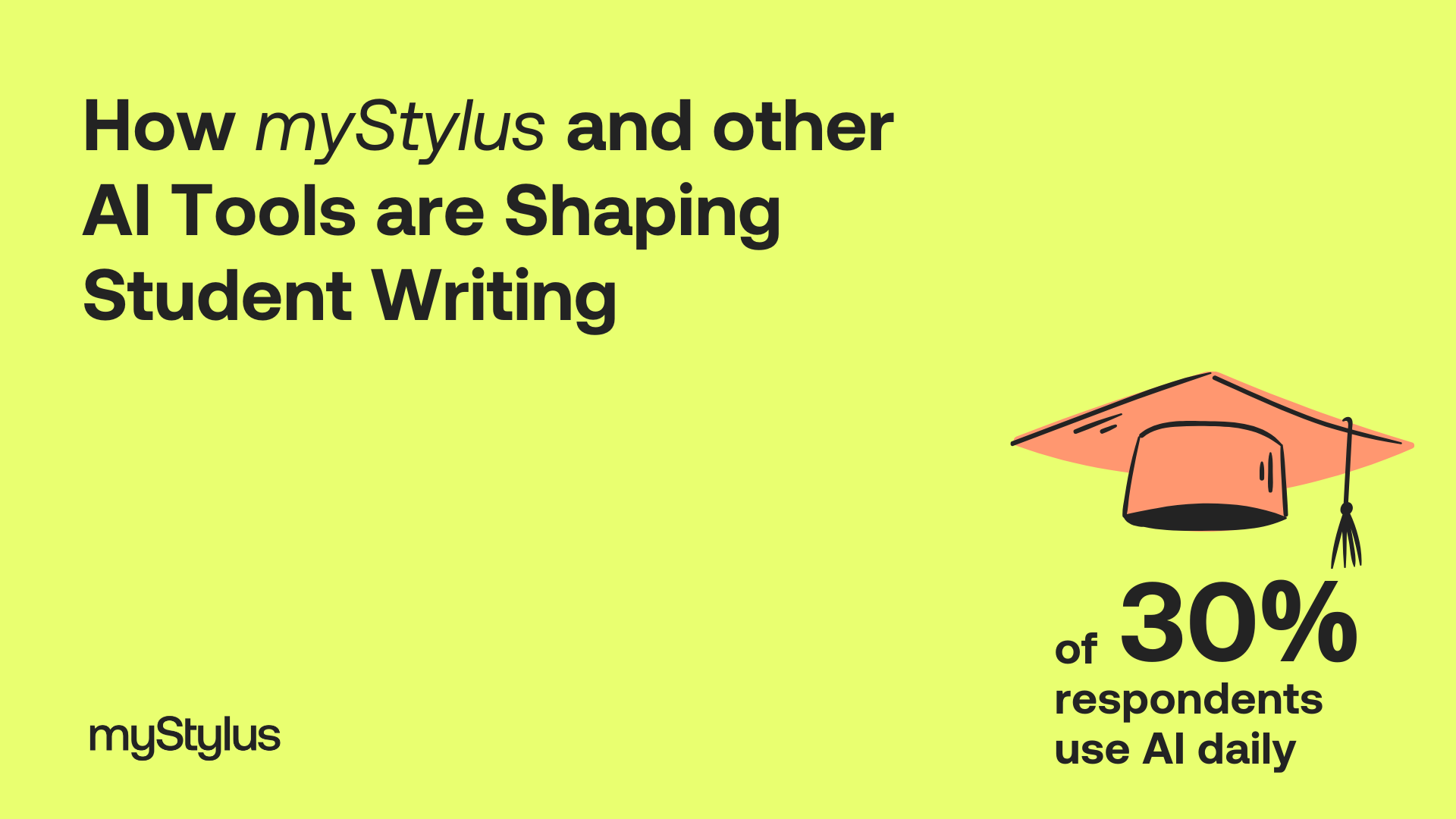
The development of AI in writing has been a fascinating journey, beginning in 2007 with a tool called StatSheet. Originally designed to generate content about sports statistics, it has come a long way since then. In 2023, the landscape underwent a significant transformation with the emergence of highly capable large language models (LLMs) such as ChatGPT, Claude, and Bard.
The advancements in digital communication have brought about a significant shift in how we engage with and access information. AI tools, such as academic writing assistants like MyStylus, have become indispensable resources in educational settings.
They provide support to students in various areas, including essay writing, homework help, and creating comprehensive academic papers. The tools provided aim to enhance the efficiency of the research and writing processes for students. They offer valuable information and suggestions to help students effectively structure their papers.
Nevertheless, even though AI is incredibly useful in academic writing, it does come with its fair share of challenges. Reliability and authenticity of the content produced by AI are significant concerns. As these tools become increasingly integrated into academic practices, it is essential to maintain a balanced perspective that considers both their advantages and the need for a critical approach.
Statistical Insights into AI Tool Usage and Perceptions
The Authority Hacker survey interviewed 3,812 individuals from 134 countries, with 36% hailing from North America. It revealed that 30.3% of respondents use AI daily, and an additional 33.8% utilize it several times per week.
Source: https://www.authorityhacker.com/ai-survey/
Among various AI tools, ChatGPT stands out as the most popular by a considerable margin.
Source: https://www.authorityhacker.com/ai-survey/
Initially, when GPT-3 was launched, there were skeptical voices about its capability to match human writing skills. However, the advent of GPT-4 has changed perceptions significantly. The survey indicates that nearly two-thirds of participants now regard AI as either equally skilled or superior to humans in content creation. This marks a notable shift in the acceptance and valuation of AI’s capabilities in writing.
Source: https://www.authorityhacker.com/ai-survey/
According to a survey by Authority Hacker, over 85% of AI users employ these tools primarily for content creation and article writing, underscoring their growing importance in professional settings.
Challenges of AI Regulation in Academic Environments
Surveys from 2023 reveal a significant level of concern among academics regarding AI writing tools: 72% of college students and 34% of educators expressed a desire to see these tools banned from college networks.
However, the situation in Italy—where OpenAI’s ChatGPT was geoblocked following local regulatory demands—highlights the limitations of such bans. This decision led to a 400% spike in VPN usage as reported by AtlasVPN, suggesting that outright bans may simply drive users to find alternative access points.
This example highlights the complexities involved in strictly banning AI technologies and suggests that a more balanced regulatory approach could more effectively address both the potential benefits and risks associated with AI in education.
In addition to these concerns, less than 10% of learning institutions had developed specific guidelines and policies for AI writing as of September 2024. There was also no consistent standard for citing or crediting original authors in pieces written with AI assistance.
Since its launch in April 2023, Turnitin’s AI writing detection tool has reviewed over 200 million papers, revealing continued extensive use of AI among students. By late March 2024, data showed that over 22 million papers were at least 20% AI-written, and over 6 million were at least 80% AI-written.
Turnitin suggests that “educators and institutions should look at a variety of factors beyond detection,” advocating for open discussions with students about appropriate AI use and a review of academic policies and essay prompts. This approach aims to better integrate AI tools into educational frameworks while maintaining academic integrity.
How MyStylus Enhances Writing and Citation Management for Students
In the challenging sphere of academic research, the tasks of writing clearly and managing citations accurately are vital to achieving scholarly success. AI-powered tools like MyStylus are transforming these daunting tasks by simplifying and streamlining the process. Positioned at the cutting edge of academic assistance technology, MyStylus offers a suite of services designed to significantly enhance the quality of student work.
MyStylus excels in providing critical support through a variety of functions tailored to meet the needs of academic writers. It offers precise grammar corrections, which are essential for crafting polished and professional documents. Additionally, its style enhancement features help students develop a more sophisticated and clear writing style suitable for academic discourse.
A quick overview of the ways in which MyStylus improves upon traditional academic writing tools is as follows:
|
📚
Instant Access to Reliable Sources
|
MyStylus streamlines your study by discovering trustworthy sources instantly. It makes use of public resources and uses the right citation styles for your paper type. |
|
✍️
Writing That Sounds Like a Human
|
The ZeroGPT detector checks all documents for human-like speech. Your use of an AI helper can be discreetly integrated into your writing process in this way. |
|
📎
Practical Advice
|
MyStylus works with you in a conversational style to collect important paper facts, then gives you step-by-step guidance based on that. After that, it takes your answers and turns them into polished prose while preserving your individual style. |
|
🧑🎓
Essays of Any Level of Depth
|
MyStylus is an industry leader in producing high-quality, individually-written academic articles of any level of depth, volume, and kind. |
|
📄
Precision in Style
|
MyStylus is here to assist students who are struggling with academic writing styles and formats by making sure their papers are well-written and formatted correctly. |
|
☝️
Text with a Solid Structure
|
At MyStylus, we pride ourselves on providing papers that are well-organized and written with accuracy. We know that effective transmission of ideas relies on clarity and precision. |
All of these elements come together to make MyStylus a must-have for students who want to become better writers and turn in high-quality academic papers.
Beyond these, MyStylus includes rigorous plagiarism checks that ensure the originality and integrity of students’ work, an absolute necessity in maintaining academic credibility.
By integrating these tools, MyStylus not only supports students in producing work that meets high academic standards but also fosters a deeper understanding of effective writing techniques, which are crucial for academic and professional advancement.
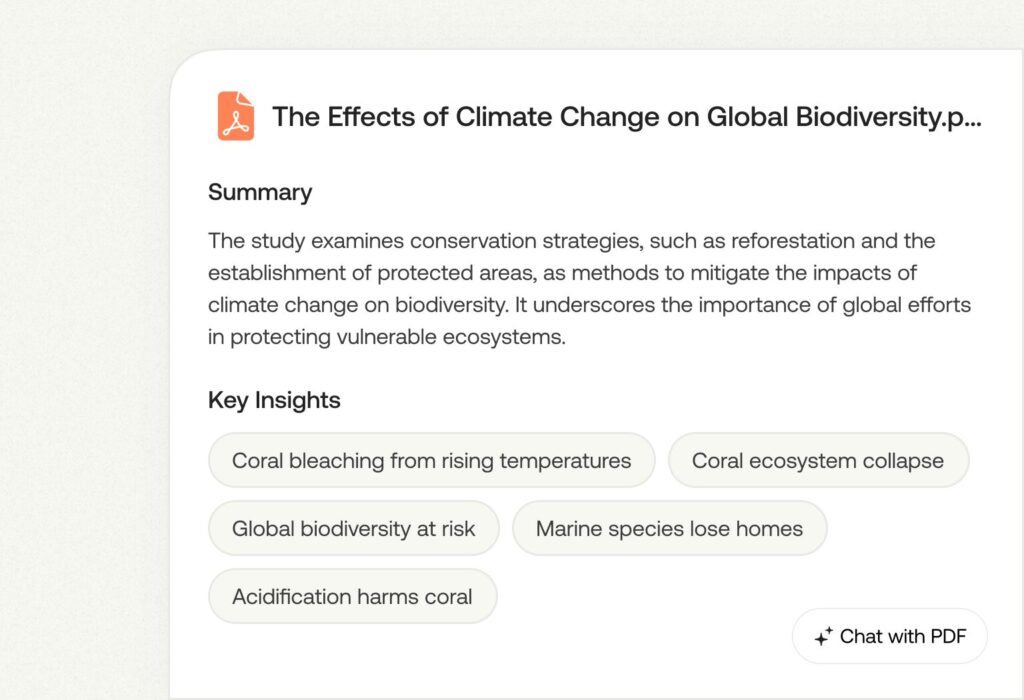
MyStylus.ai has proven to be a game-changer for academic productivity. According to a survey of 1,000 MyStylus users, the tool has proven to be highly beneficial in academic settings. A significant 60% of respondents found it incredibly helpful for conducting literature reviews and synthesizing information, while 55% praised its ability to improve the organization and structure of their content.
This feedback underscores MyStylus’s effectiveness in enhancing academic productivity and writing quality among a substantial user base.
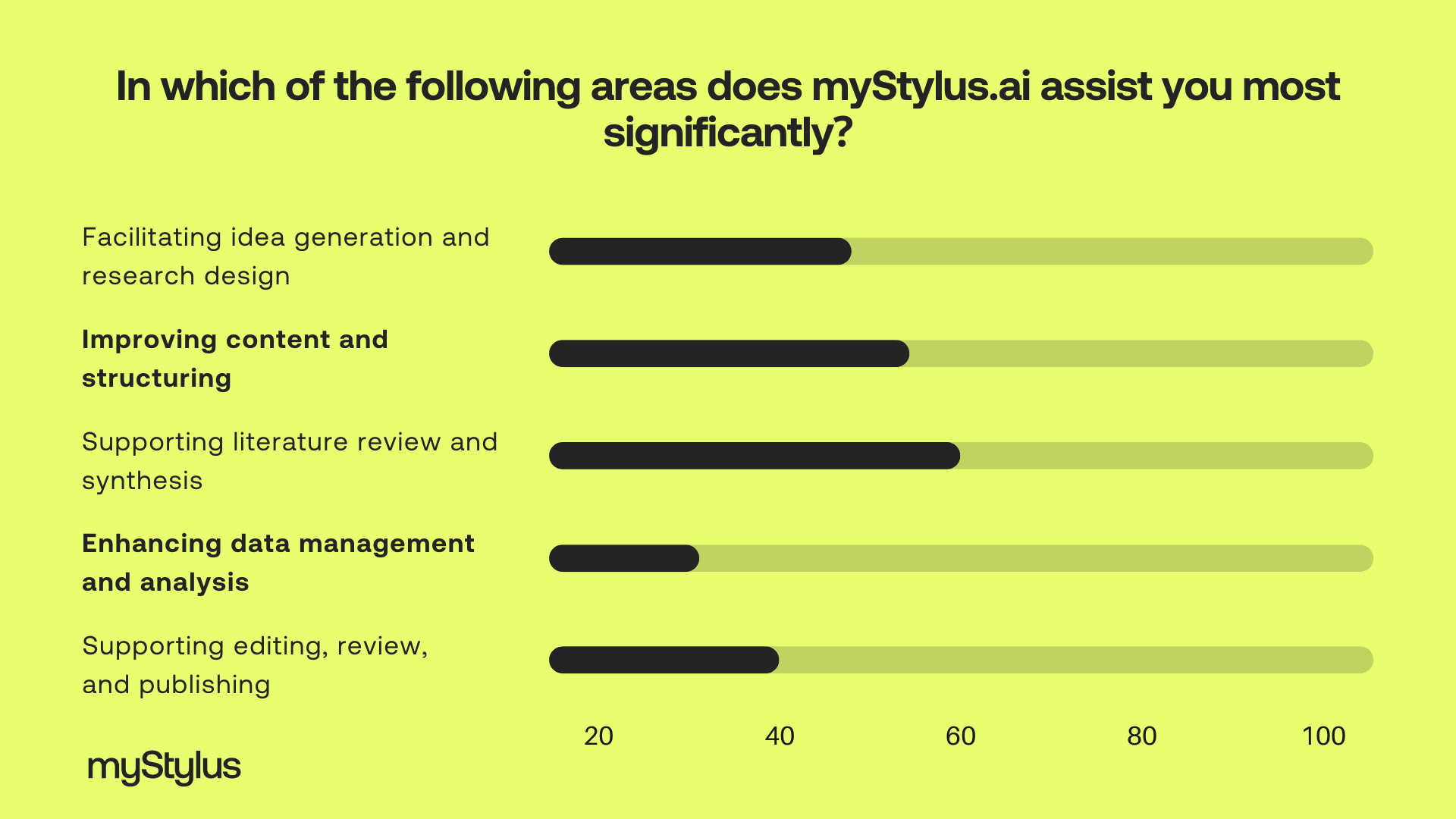
Users of MyStylus.ai also recognize the potential of AI in academia beyond just writing assistance. For instance, 66% of users value the AI’s capability to explain complex concepts, 54% appreciate its suggestions for research ideas, and 53% benefit from its article summarization features.
However, there remains a strong consensus that using AI-generated text in assessments without personal editing is largely unacceptable, with only 3% considering it appropriate.
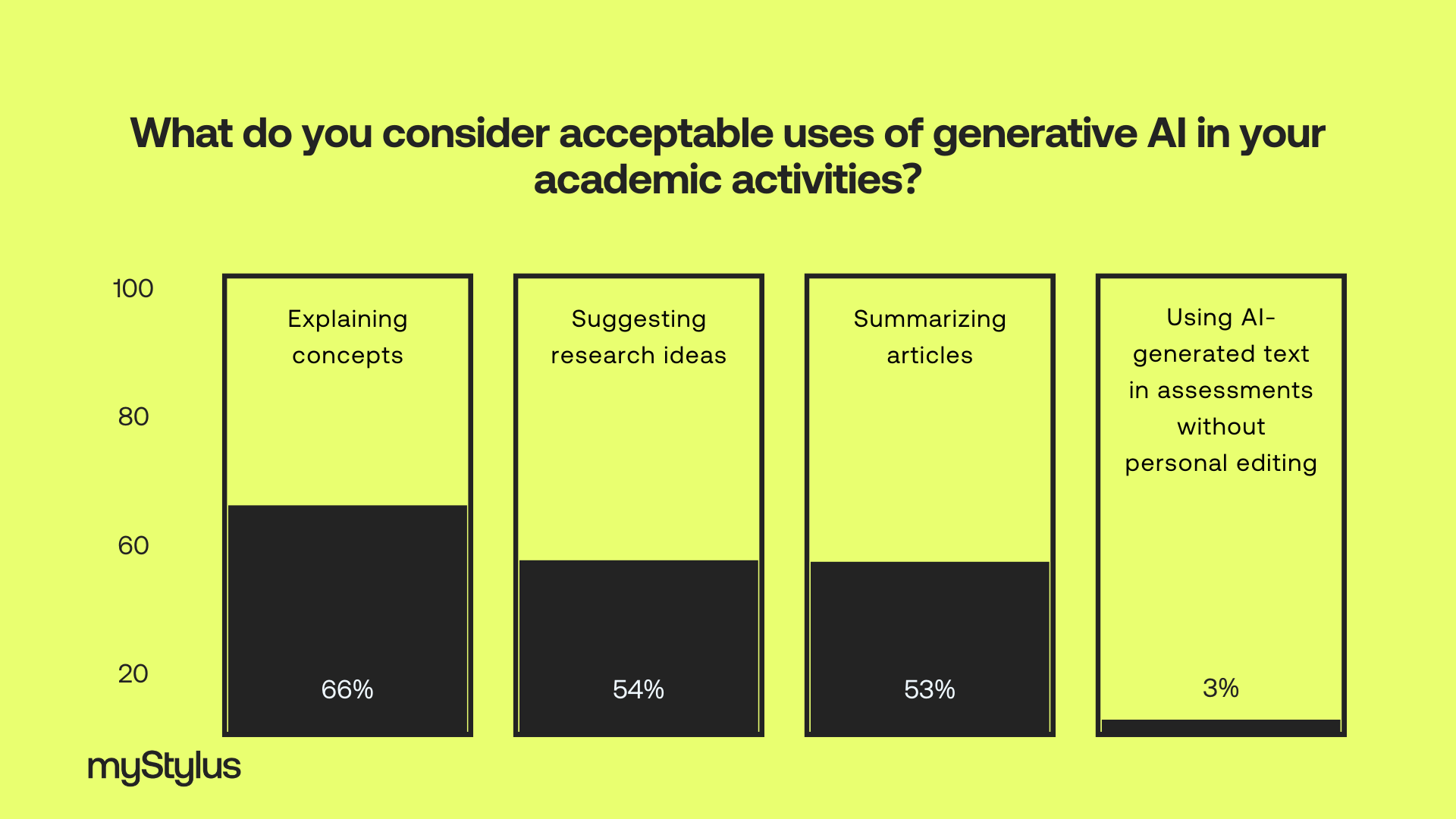
Customer reviews further underscore the practicality of these tools. One reviewer, Sarah, shared, “The review feature in MyStylus is excellent for double-checking my drafts, ensuring my arguments are clear and well-supported.”
Another review by Mike praised its efficiency, stating, “MyStylus has been a game-changer for my thesis work; the suggestions it offers are spot on, making my writing process much smoother and faster.”
Emily said in her review, “Thanks to MyStylus, I’ve seen a noticeable improvement in my writing style. The feedback it provides is incredibly detailed, which helps me understand my common mistakes.”
One more review from Alex added, “The intuitive interface of MyStylus makes it incredibly easy to use, and it’s incredibly effective at helping me organize my thoughts and refine my academic writing. MyStylus first made me suspicious that it may be a scam, but it’s completely legit!”
Jordan mentioned in the review, “Using MyStylus has not only improved the quality of my essays but also significantly reduced my anxiety around tight deadlines. Its quick, smart suggestions make writing feel less daunting. It’s not about cheating; it’s about enhancing your ability to write more effectively and efficiently. ”
However, the integration of AI tools in university settings remains a topic of debate. About 30% of academic stakeholders believe universities should provide access to these tools, while 40% oppose it, and another 30% are undecided. This division highlights the ongoing dialogue within academic communities about the role of AI in education and its implications for learning and integrity.
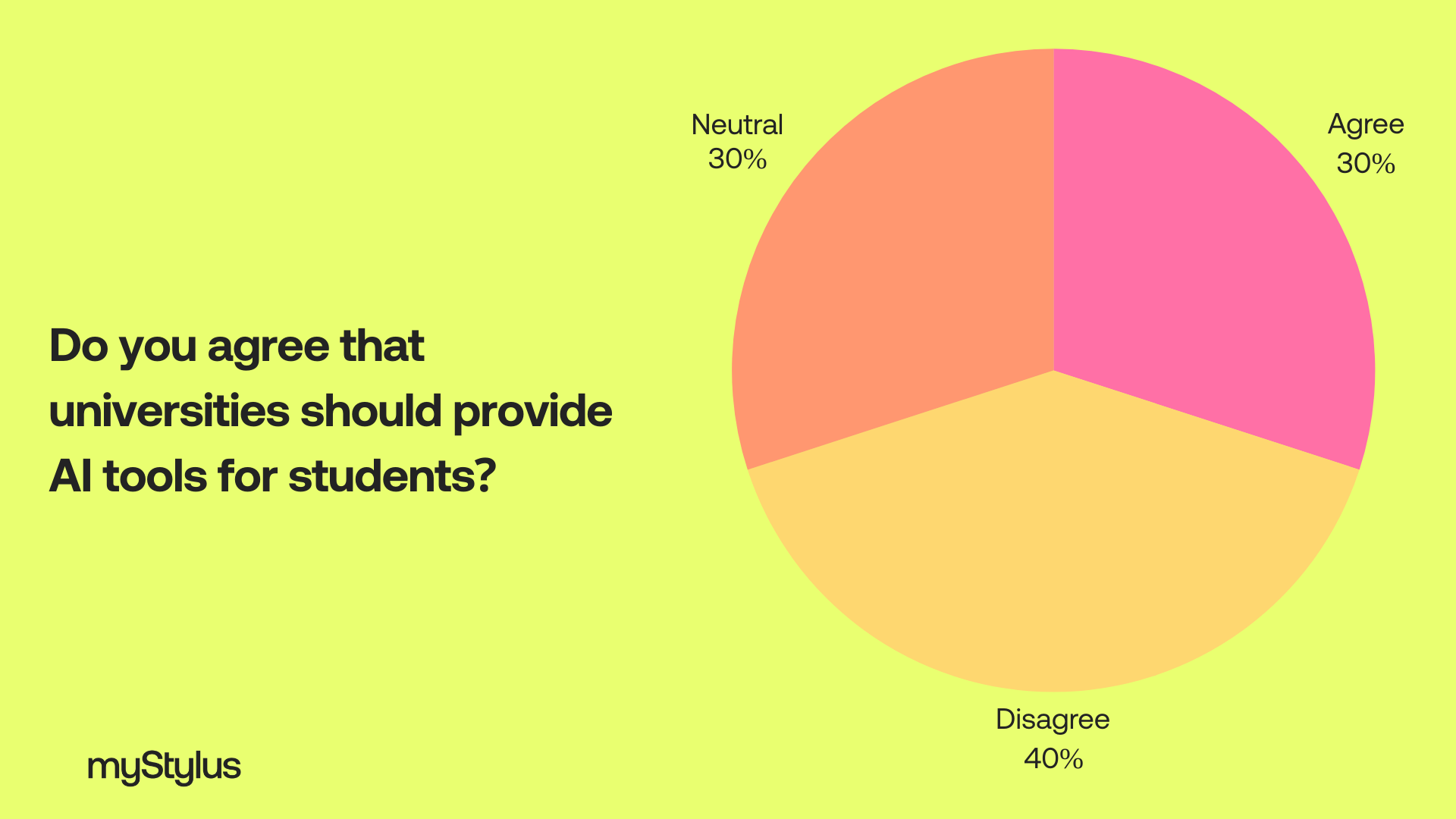
As AI continues to evolve, its integration into academic practices is likely to become more refined, balancing between technological assistance with academic ethics. For now, tools like MyStylus are making a notable difference in how students engage with and manage their academic writing tasks.
Integrating Artificial Intelligence into Classroom Instruction
In a series of interviews, several Harvard faculty members shared their positive perspectives on integrating AI into the classroom.
Stephen Chaudoin, Assistant Professor of Government, who teaches “International Conflict and Cooperation in the Modern World,” embraces AI tools rather than rejecting them. He believes banning these tools is impractical and prefers to be upfront about their capabilities, noting that the output can typically reach B-plus or B-minus levels.
In the introductory course “Principles of Economics,” lecturer David C. Martin and his team are actively crafting guidelines for using ChatGPT, indicating a proactive approach to incorporating AI in educational settings.
David J. Malan, lecturer of the course “Introduction to Computer Science,” is taking a significant step by incorporating AI tools directly into his teaching methods. Malan views the integration of AI as a natural evolution of using software in education, enhancing the teaching experience.
However, he points out that while tools like ChatGPT are extremely supportive, the aim of his course’s AI integration is to guide students in problem-solving rather than doing the work for them.
Interestingly, while more than half of the faculty respondents — approximately 51 percent — believe they haven’t received AI-generated submissions, about 31 percent feel confident in their ability to distinguish AI-generated work from student work. This highlights a growing comfort with AI’s role in education, even as it challenges traditional methods of assessment and instruction.
AI and Accessibility in Education
AI is also making education more accessible and inclusive for students with different needs. Tools like real-time transcription, text-to-speech, and language translation are breaking down barriers, helping students access learning materials in ways that work best for them. For those with disabilities, AI-powered screen readers and voice recognition software make it easier to engage with content and participate in the classroom.
AI also adapts to different learning styles. Visual learners can benefit from AI-created diagrams or infographics, while auditory learners might prefer voice notes or podcasts. Language translation tools help students who are learning in a non-native language, making resources more understandable and useful.
Platforms like ChatGPT can act as virtual tutors, offering personalized help anytime a student needs it. This is especially valuable for students who struggle to keep up in class or don’t have access to extra support outside of school.
For teachers, AI helps create lesson plans that meet the diverse needs of their students, suggesting materials that work for everyone. By making education more flexible and adaptable, AI is opening doors for students who might otherwise face challenges, ensuring that everyone has a fair shot at success.